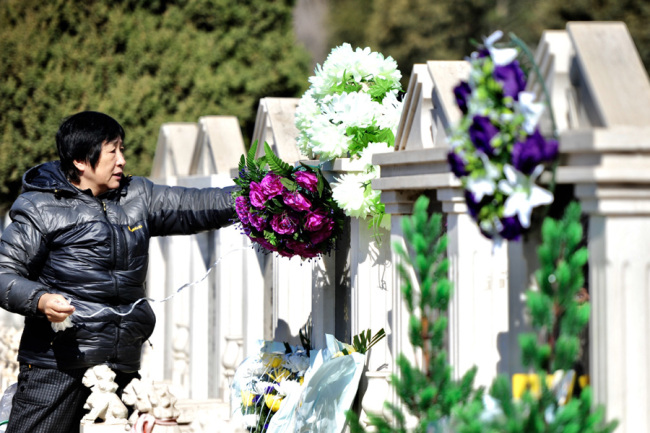
A woman lays flowers at a tomb in Shenyang, Liaoning Province on Mar 31, 2019. (Photo: IC)
More and more Chinese people abandoned the millennium-old ritual of burning joss paper as offering to their ancestors during this year's Tomb Sweeping Day.
They're instead turning to more environmentally-friendly ways to remember their deceased family members and ancestors.
Tomb Sweeping Day, which fell on April 5 this year, is a time for Chinese people to mourn the dead and worship their ancestors by visiting tombs and making offerings.
Traditionally, these offerings involve burning incense and joss paper, also known as ghost money.
But as Chinese people have become more aware of the importance of protecting the environment, this tradition has been fading away in some parts of the country and replaced with new rituals.
In Longhua County in Heibei Province, for example, free chrysanthemums were distributed to local residents at 18 locations across the county.
Local villager Wang Yulong says that the flowers are a more civilized way to remember the deceased.
"Every family goes to worship their ancestors at their tombs on this day. In the past, people would burn joss paper or incense. Now they use flowers to worship them. It doesn't damage our environment, and it won't start fires. This is a good practice. Sometimes we need to change our customs and our ideas," Wang said.
Flowers aren't the only new tradition becoming a part of Tomb Sweeping Day.
Some people have remembered the deaths of their ancestors through the written word.
This year, a funeral home in Tianjin set up a message wall in their yard. They encouraged visitors to write down their message for their loved ones in cards and tie them onto the vines growing on the wall.
"This is what I wrote on my card: 'The dead is gone, but his family tradition remains. I hope you are well in heaven. We all miss you.' It's a very reserved way of saying it, but it's a great way to express how we feel," one of the visitors showed her card.
Some younger Chinese people are choosing to leave a virtual offering for their deceased family members using one of the online platforms made for this purpose.
Another way that old traditions have been changing is the move away from traditional burials.
With graveyards across the country reaching saturation point, cremation is becoming an increasingly popular option, with people opting to have their ashes become a part of nature.
A cemetery in the city of Nanjing in Jiangsu Province has buried the ashes of 9,000 people in a 200 square meter woods.
The manager of the cemetery, Ye Zhengsheng, says this "monument free" burial can save a lot of land resources.
"Three months after the tree burial, the ashes decompose naturally. We also offer lawn and flower beds burials. Last year, we buried more than 1,600 people this way. More than 60 percent of the burials were ecological burials," Ye added.
So far over 20 thousand dead have been buried this way in Nanjing.


